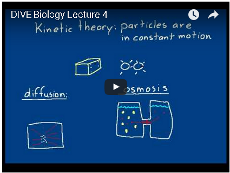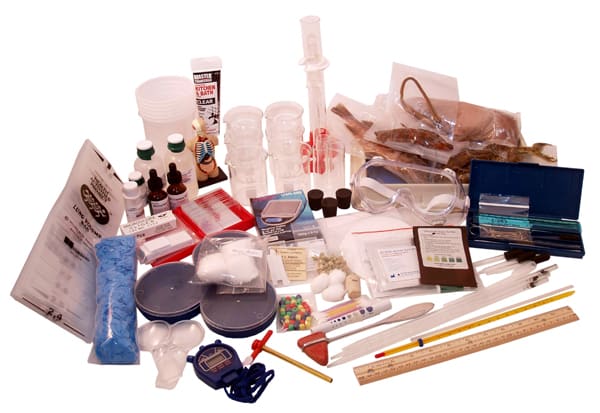DIVE Science courses offer Earth Science for junior high plus options for either standard or advanced courses for high school science in Integrated Chemistry and Physics, Biology, Chemistry, and Physics. (Note that Integrated Chemistry and Physics might also be labeled Physical Science, and this is an introductory course suggested for either eighth or ninth grade.)
A lab component is included, and students have the option of either working through video labs or using custom-designed lab kits to do hands-on work. Either option for the lab component of all of the high school level courses satisfies the college prep lab requirement.
Students can work independently through these courses. Instruction for each of these courses comes from a textbook, video lectures, and lab video lectures. All video lectures are presented by Dr. David Shormann using a video white board to show key points while he provides the voice-over explanation.
All courses except Physics are available as DIVE's Self-paced eLearning courses, although digital download and CD-ROM options remain available. (ELearning courses require a high-speed internet connection and will run on most computers or devices.) Physics is available in a combination download and streaming option or on CDs. For all except the Physics course, you also have a choice of either a free online textbook or a printed textbook that you can buy on your own (such as BJU Press's Biology). Physics requires use of a physcial copy of Saxon Physics.
Courses can be taken as Standard or Advanced. Advanced courses for Biology, Chemistry, and Physics help to prepare students to take CLEP or AP exams in those subjects. Generally, students taking a Standard course will study the same material, but they are allowed to refer to their review sheets for quarterly exams while Advanced students must have all of that information memorized. (Physics students doing a Standard course might complete only 80 of the 100 lessons for that course.) In addition, students who want to take CLEP or AP exams are urged to also use Dr. Shormann’s CLEP Professor Biology, CLEP Professor Chemistry, or CLEP Professor AP Physics courses either simultaneously or after completion of the regular course.
I reviewed only the online Biology course for this review, but eLearning courses are all similar in design. My comments through the rest of the review are based upon the dLearning Biology course but will apply in most respects to the other courses. The courses include lecture and lesson material, printable student workbooks, review questions, and exams. Optional printed workbooks are available. They have all of the lab activity pages plus the syllabus and review questions that you already get in digital format. You might want to purchase a workbook rather than print out so many pages.
The eLearning courses have many valuable features that were not available in the downloaded and CD options. These include review questions and exams that are submitted and scored online. Elearning students can review by retaking quizzes as well. The eLearning courses will track student scores, automatically weighting various types of scores to provide course grades. Parents can request grade changes and assignment resets anytime it is needed. In addition, study tools such as digital flashcards and Quizlets are incorporated into eLearning courses.
Each course begins with a Getting Started video, and this is the same video for Earth Science, Biology, Chemistry, and Integrated Chemistry and Physics courses. Note that the Biology course’s eLearning Laboratory Workbook also has important instructions for parents or teachers at the front that apply to the entire course, so don’t miss them. On the Getting Started video, Dr. Shormann walks parents and students through course components, showing which things need to be downloaded in advance. He explains grading systems that might be used.
In addition to the Getting Started video, the DIVE Syllabi and Course Instructions (read or printed from your computer) provide essential, detailed information on the course and must be read before students start a course.
The online course menu is where students will begin their lessons. Weekly lesson plans expand into daily assignments with links to all other online course components such as digital flashcards, the reading assignment in their digital text, the video lecture, review questions, video labs, and exams.
Each week starts out with work on vocabulary and reading from the selected text. They might have a number of text reading assignments for the week. Students will study or write out vocabulary words. Usually, students will watch a lecture on the second day of the week but there might be more than one lecture during the week. Lab work happens at the end of each week.
As I mentioned before, you can choose to use the free online textbook or a printed textbook. The free online textbook is really a collection of online articles by various authors at different websites such as Answers in Genesis and Creation Wiki that teach the content of individual topics. For those who prefer a print text, you can choose from among a number of printed texts. Dr. Shormann has created syllabi that correlate many textbooks with the course and will prepare a custom syllabus if needed. While, for Biology, he recommends the BJU Press Biology text as the best printed-text option, he includes both Christian and secular texts as well. As Dr. Shormann explains, he approaches science from a biblical Christian perspective, so even if you choose a secular text, the courses are still designed for Christian students.
Video lectures vary in length, but they are relatively brief, hitting only the highlights of lesson material that students are expected to know. Students must take notes as they listen to the lectures since they will be tested primarily on lecture content.
Review questions following each lecture are answered on the computer as a means of reinforcing information from the lecture as well as vocabulary. While they are scored by the program, they are considered as practice rather than as quizzes and are weighted accordingly. Scores are recorded the first time a review is taken, but students can go through these to review information. If they miss a question, they receive feedback so that they can try again.
The eLearning Laboratory Workbook is used in conjunction with Dr. Shormann’s video lab lessons. Video labs require students to take notes and complete work in their lab workbook. There are three types of lab activities: observations with data collection, experiments, and dissections. Many activities require students to draw and label what they observe in their lab workbook. They can use the optional lab kit (available through Nature’s Workshop Plus) for hands-on activities, although viewing the extensive video labs will provide sufficient familiarity with lab equipment, observations through a microscope, and other lab work. In fact, with Dr. Shormann’s expertise, students might actually be able to see and experience more on the video labs than they would be able to see on their own. Lab activities include specific AP and CLEP lab activities upon which students will be tested when they take those exams. Students should print out the Laboratory Workbook and put it into a binder along with binder paper to be used for lecture notes and other work.
If you purchase the printed version of the Laboratory Workbook, be aware that it includes the review questions, and those taking the course online can simply skip review questions in the workbook.
Courses all require some math applications, and students should have a scientific calculator for some of the lab activities. (This is more critical for Chemistry and Physics than for other courses.)
Periodic online Quizlets are included in the eLearning assignments. Courses schedule every ninth week of the 36-week course to be dedicated to review and study in preparation for taking a quarterly exam. The exams are also taken online, and scores are automatically recorded.
All courses allow students to send questions to Dr. Shormann via email if they have any problems.
Students access eLearning courses with subscriptions that run for 12 months. Siblings can take the same course simultaneously or as a renewal for only $20. The courses on downloaded courses or those on CD-ROMs can be reused.
Summary
The DIVE science courses provide almost everything the student needs. They are very inexpensive, especially if you use the free digital textbooks. The lab kits can make a huge difference in cost, so the fact that Dr. Shormann makes these optional is a huge help for those who can’t afford them.
Courses do require students to apply themselves, putting in intensive study time, taking notes, completing lab activities, etc. To some extent, students can choose how much time to spend reading, studying, and learning the material, and they will benefit accordingly. Even so, the courses offer home educated students the opportunity to study at a level that will prepare them for college-credit exams while still learning science from a biblical Christian perspective, all for a very reasonable cost.











